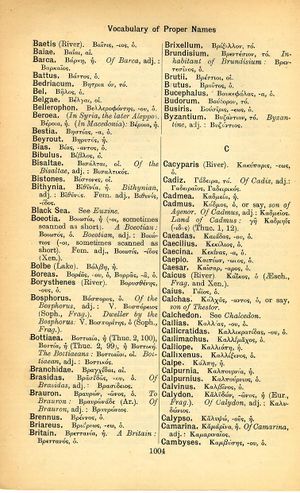Caesar
Έγ', ὦ ταλαίπωρ', αὐτὸς ὧν χρείᾳ πάρει. Τὰ πολλὰ γάρ τοι ῥήματ' ἢ τέρψαντά τι, ἢ δυσχεράναντ', ἢ κατοικτίσαντά πως, παρέσχε φωνὴν τοῖς ἀφωνήτοις τινά –> Wretched brother, tell him what you need. A multitude of words can be pleasurable, burdensome, or they can arouse pity somehow — they give a kind of voice to the voiceless.
English > Greek (Woodhouse)
Καῖσαρ, -αρος, ὁ.
Latin > English (Lewis & Short)
Caesar: ăris (CAESERIS, C. I. L. 4, 2308; Inscr. Orell. 4205: CAESARVS, C. I. L. 1, 696), m., = Καῖσαρ [a caeso matris utero, Plin. 7, 9, 7, § 47; cf. Non. p. 556, 32:
I a caesarie dictus, qui scilicet cum caesarie natus est, Fest. p. 44; cf. Comment. p. 383. Both etymm. also in Isid. Orig. 9, 3, 12, and Spart. Ael. Ver. 2. Better acc. to Doed. Syn. III. p. 17, from caesius, caeruleus, the color of the skin; cf. Rufus, a cognomen in the gens Julia. Of these the most celebrated, C.Julius Caesar, distinguished as general, orator, statesman, and author, was assassinated by Brutus and Cassius, B.C. 44. After him all the emperors bore the name Caesar, with the title Augustus, until, under Adrian, this difference arose: Augustus designated the ruling emperor; Caesar, the heir to the throne, the crown-prince, etc., Spart. Ael. Ver. 1, § 2; Aur. Vict. Caes. 13, § 12.—
II Derivv.
A Caesărīnus, a, um, adj., of or relating to the triumvir Julius Cœsar, Cœsarian: celeritas, Cic. Att. 16, 10, 1 Orell. N.cr.—
B Caesărĭānus, a, um, adj.
1 Of the triumvir Cœsar, Cœsarian: bellum civile, Nep. Att. 7, 1.— Hence, Caesărĭāni, ōrum, m., the adherents of Cœsar in the civil war (as Pompeiani, his opponents), Hirt. B. Afr. 13: orationes, orations of Cicero in which Cœsar was praised (pro Marcello, Deiotaro, De Provinciis Consularibus, etc.), Serv. ad Verg. G. 2, 131.—
2 Imperial, Vop. Carin. init.: Pallas (esp. honored by Domitian), Mart. 8, 1.—Hence, subst.
a Caesărĭāni, ōrum, m.
(a) A class of provincial imperial officers, Cod. Just. 10, 1, 5; 10, 1, 7; Cod. Th. 10, 7.—
(b) Partisans of Cœsar, Auct. B. Afr. 13; Flor. 4, 3.—
b Caesărĭānum, i, n., a kind of eye-salve, Cels. 6, 6, n. 27.—
C Caesă-rĕus, a, um, adj.
1 Of or pertaining to the triumvir Cœsar, Cœsarian (mostly poet.): sanguis, Ov. M. 1, 201: Penates, id. ib. 15, 864: Vesta, id. ib. 15, 865: forum, founded by him, Stat. S. 1, 1, 85.—
2 Imperial: amphitheatrum, built by the emperor Domitian, Mart. Spect. 1, 7: leones, presented by Domitian in the fight of wild beasts, id. Epigr. 1, 7, 3.
Latin > French (Gaffiot 2016)
(2) Cæsăr,⁵ ăris, m., nom de famille dans la gens Julia ; dont le personnage le plus important fut Jules César || titre porté par les empereurs et même, à partir d’Adrien, par les héritiers présomptifs de l’empire || -rĕus, a, um [poét.] ou -rīnus, a, um, ou -rĭānus, a, um, de César : Cic. Att. 16, 10, 1 ; 6, 8, 2 || Cæsărĭānī, ōrum, m., partisans de César : B. Afr. 13 ; ou agents de l’empereur dans les provinces : Cod. Th. 10, 7 || -rĭānum, ī, n., espèce de collyre : Cels. Med. 6, 6.

